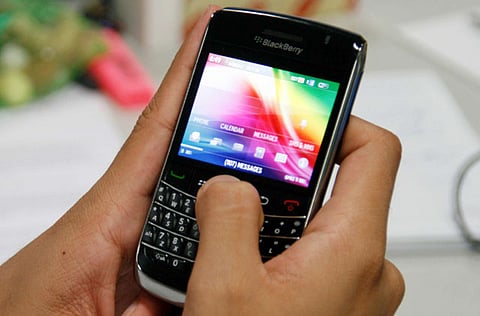Misuse of instant messaging services punishable by law
People using BlackBerry, iPhone or other devices to spread rumours are violating the law

Abu Dhabi: Abu Dhabi police has warned that spreading malicious rumours and fake news through BlackBerry messenger (BBM) is punishable by law and offenders could by jailed up to three years.
A police spokesman said yesterday rumours that could cause confusion among the public and lead to destabilisation of the country's security will be dealt with severely and the groups or individuals who initiate such kind of messages will be indicted.
Malicious rumours have a major impact on members of the society.
A special concern was raised with respect to the wide use of telecommunication devices such as BlackBerry, iPhone, Nokia and other instant messenger devices that are available for public use. Concerns were also raised about possible mechanisms that either etisalat or du would follow in this regard.
Obliged
Mohammad Al Ganem, General Manager of UAE's Telecommunications Regulation Authority (TRA), told Gulf News that the two service providers, etisalat and du, are obliged to follow any rules and regulations that are decreed by official or judicial authorities in the country.
Both providers will follow the concerns raised by Abu Dhabi police and implement policy as required by the law, he said.
Al Ganem stressed that Abu Dhabi police's decision last week stems from the specific articles of the UAE penal code regarding libel, slander, insult and defamation against individuals.
"Spreading such rumours is considered a crime that is punishable," Al Ganem said.
He said the police warning was not exclusive to BlackBerry devices only.
"The misuse of any other telecommunication device will be treated in the same way. This includes iPhone, Nokia, Sony Ericsson, Samsung or any other devices." Al Ganem said the law punishes the act of spreading rumours and defamatory remarks, regardless of the type of device used to disperse them.
He said BlackBerry is one of the most widely used device in the country for instant messaging purposes.
‘Clear definitions'
"There are clear definitions in the law to explain the exact meanings of spreading rumours, spreading lies, or spreading defamatory remarks", Al Ganem said.
Spreading rumours, he said, includes sending information through instant messenger services (BBM, and SMS) to the public without ensuring the accuracy of the piece of information.
"This uncontrolled broadcasting of falsified information will lead to spreading fear or creating panic among people. He said spreading rumours regarding specific merchandise or even mentioning names of outlets that sell such merchandise is considered illegal by the UAE law.
"Spreading false information regarding fires, murder or other crimes are included in the Abu Dhabi police warning. Normally, identifying the source of the rumour is handled by a designated investigative authority," he said.
Invasion of privacy
Al Ganem said rumours against individuals and invasion of privacy without supported evidence will be considered a rumour which will be handled strictly as per the warning of Abu Dhabi police.
The police initiative, he said, is aimed at putting an end to the phenomenon of spreading false information and to send a clear message that such kind of action will not be tolerated.
Etisalat confirmed that it had received an official note from TRA explaining the responsibility of the service providers as per the police warning.
An etisalat source said: "In case one of our telecommunication customers is accused of misusing the service, the law will take its action in this regard."
Staff phones blocked
The total number of BlackBerry customers in the UAE is 730,000 by the end of 2010. 480,000 with etisalat and about 250,000 with du.
This number includes both individuals and companies in both private and government sectors.
Sources at a telecommunication provider told Gulf News that some big companies, especially government ministries, departments and semi-government companies which provide BlackBerry devices to their employees have already blocked the access to BlackBerry messenger.
These organisations have officially requested etisalat and du to block BB messenger. They want to prevent their employees from being suspected of spreading rumours through their devices.



